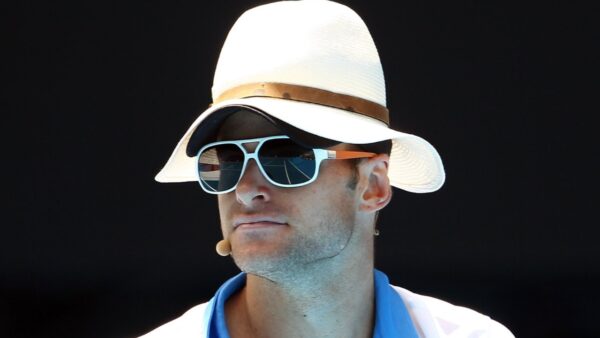Has an F1 driver ever won a race without leading a single lap?
A total of 7 drivers have won a Formula One race without leading a single lap of it, with the circumstances in their favor.

The 1994 Belgium Grand Prix (Credits: The Telegraph)
🔍 Explore this post with:
Formula One premiered as the pinnacle of motorsport back in 1950, holding its first-ever season. The sport has progressed immensely since then, having witnessed countless iconic moments. While many moments involve drivers dominating races or executing breathtaking overtakes, several unusual occurrences have also occurred. One such example can be drivers taking victory at an F1 Grand Prix without having led a lap the entire race, perplexing as it sounds.
These drivers did not cross the finish line first or lead any individual lap during the race. Nevertheless, circumstances aligned in their favor, and they emerged as the winners when the checkered flag waved. Despite not displaying dominance on race day, these drivers secured maximum points and earned the title of Grand Prix winner. Such instances remind the world that Formula 1 can be unpredictable and that success can come unexpectedly.
The tales behind how these seven drivers managed what seems to be an impossible feat will be explored, given that a typical F1 race victory in the modern day is signified by domination throughout the weekend sessions and leading the majority of the race on the track.
Related: Who is the most successful F1 team principal?
Here is the list of drivers who won a race without leading a single lap
1. Luigi Fagioli – 1951 French Grand Prix
The first instance of a driver winning an F1 GP without leading a single lap occurred during the second-ever season since the sport’s inception. Luigi Fagioli, driving for Alfa Romeo, had a relatively meager qualifying session, starting the race from only P7 on the grid. Meanwhile, his teammate Juan Manuel Fangio had an impressive qualifying performance, securing the pole position. Alfa Romeo was a prominent entity, inclined to victory back then, contrary to today.

At the start of the race, Juan Manuel Fangio held the lead but soon encountered mechanical issues. As a result, the team decided for Fagioli to relinquish his car to their star Fangio during a pit stop. Fangio continued the race and ultimately emerged as the winner of the French Grand Prix. However, due to the shared driving arrangement, Fagioli was also credited with the victory, even though he crossed the finish line in P11. Notably, Fagioli became the oldest driver to win an F1 race, a small consolation.
Unfortunately, this incident did not sit well with Fagioli, renowned for his fiery temperament, and he decided to retire from F1 after the race events. The circumstances surrounding the shared victory and the team’s decision influenced his choice to leave the sport.
2. Luigi Musso – 1956 Argentine Grand Prix
Once again, perhaps coincidentally, the second occurrence of a driver winning a race without leading a lap involves Juan Manuel Fangio. During the 1956 Argentine Grand Prix, Luigi Musso was credited with a win after sharing his car with Fangio, his teammate. Both drivers were part of Scuderia Ferrari, with Fangio starting the race from pole position and Musso from P3 on the grid. During the race’s early stages, Fangio encountered mechanical issues and was forced to retire.

In response, Ferrari called Musso into the pits and instructed him to surrender his car to Fangio. Musso willingly complied with the team’s order. Ferrari secured the victory from a determined performance by Fangio and a series of unfortunate mechanical failures for other race leaders. As a result, both Fangio and Musso were awarded the win, and the teammates shared the points.
This race showcased the teamwork and camaraderie within the Scuderia Ferrari team, as Musso selflessly relinquished his car to Fangio, ultimately contributing to their joint success in the Grand Prix.
3. Tony Brooks – 1957 British Grand Prix
The 1957 British Grand Prix proceedings witnessed Tony Brooks and Stirling Moss share a victory, signifying the third and final time such an occurrence occurred in Formula 1 history. Brooks started the race from the third position, while his teammate Moss began from the pole position. Brooks was still recovering from priorly sustained injuries, while Moss demonstrated his prowess by securing a strong starting position.

However, Moss encountered a mechanical problem that necessitated a pit stop. Sensing that he might not complete the race, Tony Brooks returned to the pits and handed over his machinery to Moss. Motivated and unwaveringly determined, Moss charged back onto the track, fiercely battling to claim the top spot. With mechanical failures and incidents among the leading competitors, Moss seized the lead and ultimately secured a memorable victory in his home race.
As a result of sharing the car and their combined efforts, Moss and Brooks were awarded the joint victory, solidifying their names in the annals of Formula 1 history.
4. Niki Lauda – 1978 Italian Grand Prix
German legend Niki Lauda is renowned for his immense feats as an F1 driver. However, this race win is a lesser-known achievement of his. Despite crossing the finish line first, Italian Mario Andretti’s victory at the race would not be officially credited to him. Andretti, representing Ferrari, had a flawless performance throughout the weekend, starting from pole position and setting the race’s fastest lap.

Tragically, a severe accident occurred on the very first lap, resulting in the eventual death of Ronnie Peterson. As a result, the race was red-flagged before the leaders completed a full lap. The race was restarted later in the evening with a reduced race distance. During the restart, Andretti and Gilles Villeneuve engaged in a fierce battle for the top position. However, both drivers were penalized with a one-minute time penalty for jumping the start. Niki Lauda, who held onto the third position, remained steadfast.
Mario Andretti crossed the finish line first, followed by Villeneuve and Lauda. However, due to the penalty, when the additional time was added to Andretti and Villeneuve’s race times, Lauda found himself in first place, ultimately securing the victory.
5. Alain Prost – 1982 Brazilian Grand Prix
Frenchman Alain Prost is one of the most revered drivers to ever get behind the wheel of an F1 car. But his race victory wasn’t taken by his overwhelming prowess at the helm. The then-Renault driver emerged as the winner of the 1982 Brazilian Grand Prix due to the disqualification of the top two drivers. Prost started the race in pole position but had a slow start and was overtaken, relinquishing his lead before the end of the first lap. Despite his strongest efforts, he couldn’t regain the lead throughout the race at Jacarepagua.

The home-favorite driver Nelson Piquet Sr., driving for Brabham, and Keke Rosberg, driving for Williams, surged ahead and crossed the finish line in first and second place, respectively. However, both drivers were later disqualified for failing to meet the minimum weight requirements. As a result, the victory was awarded to Alain Prost. The race demonstrated how a sudden turn of events and disqualifications could impact the outcome in F1.
Such are the intricacies of the sport, where even the weight of your machinery following a hard-fought race can undo all the hard work put in throughout the race weekend.
6. Elio de Angelis – 1985 San Marino Grand Prix

The San Marino Grand Prix of 1985 is often remembered as one of the most peculiar races in F1 history. It was marked by several incidents, including accidents, engine failures, and drivers running out of fuel. Just three years after his lucky victory under the same circumstances, Alain Prost was disqualified from the San Marino Grand Prix for failing to meet the minimum weight requirements, leading to a significant change in the race’s outcome.
As the race neared its conclusion, the favorite Ayrton Senna ran out of fuel, relinquishing the lead to Stefan Johansson. However, Johansson also experienced the same misfortune and ran out of fuel on the same lap. This turn of events allowed Alain Prost to cross the finish line first, followed by Elio de Angelis, Patrick Tambay, and Thierry Boutsen. Notably, Boutsen ran out of fuel just before the finish line but managed to push his Arrows-BMW car across to complete the race.
However, Prost’s disqualification due to the weight discrepancy altered the final results. As a result, Elio de Angelis was credited with the victory, which marked the second and final win of his Formula 1 career. The race showcased the unpredictable nature of F1, with unforeseen circumstances and disqualifications reshaping the outcome.
7. Damon Hill – 1994 Belgium Grand Prix
Former world champion Damon Hill is the last driver to win without leading a lap throughout the race. In the 1994 Belgium Grand Prix, eventual world champion Michael Schumacher was disqualified for violating the rules related to the aerodynamics of his vehicle. Starting from second position, Schumacher swiftly overtook pole-sitter Rubens Barrichello on the first lap to claim the lead.

Although Michael Schumacher spun off the track early in the race, he managed to cling to his position at the front. Driving for Williams, Damon Hill maintained a solid pace and finished the race in second place behind Schumacher. However, the race stewards discovered that the skid block underneath Schumacher’s car exhibited excessive wear, leading to his eventual disqualification. The skid block was mandatory for all cars and was introduced two races before the Belgium Grand Prix.
Its purpose was to raise the cars’ ride height and mitigate the advantages of ground effects. According to the regulations, a maximum wear of 1mm on the skid block was allowed. Any wear beyond this limit would result in the ride height being too low, providing the team with an illegal aerodynamic advantage. Despite Benneton’s subsequent appeal that the wear resulted from Schumacher’s spin, the decision was upheld due to the wear pattern, and the victory was awarded to Damon Hill. The incident highlighted the significance of adhering to technical regulations in Formula 1 and the subsequent impact on race outcomes.
Has a driver ever won an F1 race without leading a single lap?
Seven drivers have won races without leading a single lap in the history of f1. Some won because the winner was disqualified, while others are the win with their teammates.
Can an F1 driver win a race without leading any laps?
It’s possible. Either the driver overtakes the race leader on the final lap to win or gets the win after the winner’s disqualification.
Who is the last driver to win an F1 race without leading any laps?
Damon Hill is the last driver to win an F1 race without leading a lap. His win came in in the 1994 Belgium GP.
In case you missed it:
- Who is the most successful European F1 driver of all time?
- Who is the most educated Formula 1 driver?







